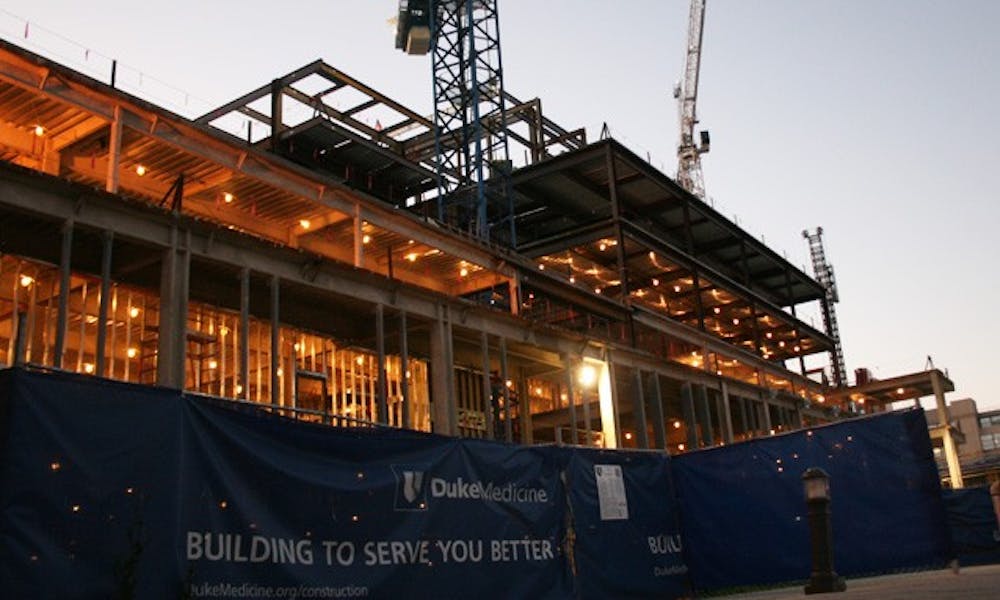The Duke University Health System topped out the steel skeleton Sunday for its $230 million new Cancer Center, which will be a fundamental part of the development of the Duke Cancer Institute.
The DUHS Board of Directors recently approved a $50 million package for the institute’s recruitment and program development, bringing the total cost of the institute, the new facility and related expenses to approximately $400 million over a multi-year period.
The Duke Cancer Institute will integrate the currently disjointed oncology system under one organizational structure for the first time in the University’s history in order to provide better patient care. The new Duke Cancer Center facility, which will create a central location for outpatient services as part of the institute, is scheduled to be completed in early 2012.
“What’s unique about this is it’s really breaking down the current departmental structure and putting everything under one umbrella called the Duke Cancer Institute,” said Dr. Victor Dzau, chancellor for health affairs and president and CEO of the Duke University Health System. “Research and care are together now under one single organization.”
Dr. Anthony Means and Dr. Chris Willett have been named interim co-directors of the institute while Duke Medicine continues its search for a permanent executive director. Dr. Kim Lyerly will remain the principal investigator on the National Cancer Institute’s Comprehensive Cancer Center Core Grant.
“[Means and Willett] have been outstanding,” Dzau said. “Not only have they been central to the planning and helping us organize and mobilize a lot of faculty and other support, but they’re also going to take on the heavy job of running the institute together as partners—Dr. Means on research and Dr. Willett on clinical. They’re going to move forward so that we don’t miss a beat while we look for an executive director.”
Eventually, the new director will lead both the clinical and research oncology parts of the institute.
“It is a great honor to be co-interim leader of the institute with my colleague,” Willett said. “The new developments at Duke for our patients will be continued excellence and state-of-the-art care but also innovative and unique programs across the spectrum of daily care to new trials and programs. For faculty and staff, the Duke Cancer Institute provides opportunities of further integration of clinical and research activities, as well as new resources of collaboration and scientific advancement.”
Dzau said the institute will facilitate communication between research and treatment components of the health system.
“These days research and development are so fast that the sooner we can get to patient care, the sooner we can help the patients,” he said.
The seven-story, 267,000 sq.-ft. Duke Cancer Center will be connected to the Morris Cancer Clinic, which is currently the primary place for oncology treatment. The new center will have 75 infusion stations, 140 examination rooms, a pharmacy and an outdoor garden terrace for chemotherapy patients. The center will also include more luxurious amenities, such as a cafe and a patient boutique.
Together, the Duke Cancer Institute and the Cancer Center are expected to make treatment at Duke much more effective.
“The new building will allow cancer patients access to everything they need on outpatient visits under one roof,” Means said. “It will allow Duke to hire additional cancer researchers and clinicians to make the disease-based and approach-based programs the best that they can be.”
Additionally, the development of the Duke Cancer Center will benefit Durham’s economy immensely, Dzau said.
“We expect to create 1,000 new jobs,” he said. “Even now we are creating a lot of jobs with construction workers. When we open up, we will obviously be hiring staff and nurses and physicians, too. It’s quite significant.”
Although the initiative includes the creation of new buildings, Duke Medicine’s goal is to integrate all cancer research and care into one organizational and functional structure, Dzau said.
“We are developing a model that is similar to stand-alone institutes with their whole mission around cancer,” Dzau said. “We... are a much larger medical center, but within the center we are creating this institute since we believe it is best for our patients. I’m totally committed to [the institute], and my role is to make sure that it is successful.”
Get The Chronicle straight to your inbox
Signup for our weekly newsletter. Cancel at any time.

